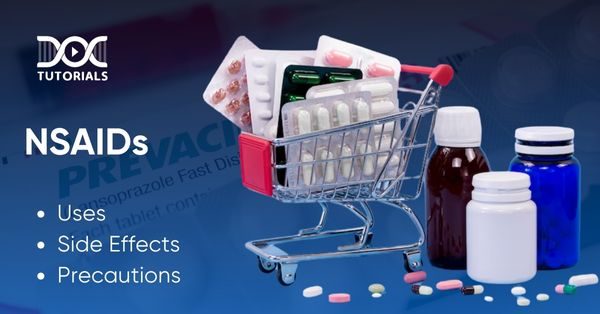NSAIDs: Uses, Side Effects, and Precautions

NSAIDs: Uses, Side Effects, and Precautions
Non-steroidal anti-inflammatory drugs (NSAIDs) are the most frequently prescribed medications worldwide to manage pain, inflammation, and fever. This versatile family includes ibuprofen and aspirin, which are available over the counter alongside prescription-strength versions.
NSAIDs succeed in treating headaches and arthritis symptoms, but users face various side effects that affect the stomach and heart and cause kidney damage. The identification of proper care practices demands a clear comprehension of how these drugs function while highlighting their safe usage boundaries.
The following discussion investigates NSAIDs’ therapeutic purposes, their medical advantages, relevant risks, and necessary patient safety precautions.
What are NSAIDs?
Nonsteroidal anti-inflammatory drugs (NSAIDs) reduce pain, inflammation, and fever and are among the most commonly used medications for adults. Common forms include the over-the-counter type, such as aspirin, ibuprofen, and naproxen sodium, and stronger prescription versions when necessary.
NSAIDs are prescribed for a wide range of health problems, including headaches, dental pain, arthritis, and muscle stiffness. NSAIDs are available in different forms, including tablets, liquids, gels, and suppositories. They work by blocking prostaglandins, hormone-like substances that cause inflammation.
The medications are classified into their class by chemical structure and enzyme specificity. Some are available over the counter, while others can only be obtained with a prescription because of their potential or specific uses.
Uses of NSAIDs
NSAIDs are widely used all over the world for numerous factors. Some of them include:
- Pain Relief
However, NSAIDs are effective pain relievers for mild to moderate pain, including headaches, toothaches, menstrual cramps, and post-surgical discomfort.
- Inflammation Reduction
These medications effectively reduce inflammation throughout the body and decrease swelling, redness, and heat following a flare-up of arthritis, tendonitis, or sprains.
- Fever Management
Because NSAIDs can affect the hypothalamus in the brain to lower high body temperature, they help treat fevers of common illnesses and infections.
- Arthritis Treatment
NSAIDs are extremely important for symptom control by reducing joint pain, stiffness, and swelling in rheumatoid arthritis and osteoarthritis for people with arthritis.
- Migraine Relief
NSAIDs are effective in treating migraine headaches since they reduce inflammation and block pain signals in blood vessels in the brain, which sometimes stops migraines from developing fully.
- Gout Management
NSAIDs are effective at treating the acute, quite painful attacks associated with gout; relief is obtained within hours of administration.
Benefits of NSAIDs
NSAIDs are used for a plethora of medical conditions, thus having several reasons that can help benefit the user. Some of them are listed as follows:
- Improved Functionality
NSAIDs reduce pain and inflammation so that individuals can do daily activities and live a better life during painful conditions.
- Enhanced Mobility
NSAIDs enhance mobility in patients with musculoskeletal diseases by increasing the ability to undergo range of motion, or functional ability, during recovery and rehabilitation.
- Cardiovascular Protection
Unique benefits of low-dose aspirin are that it helps prevent blood clots and reduces the risk of heart attacks and strokes in high-risk patients.
- Easy Accessibility
Many NSAIDs are available over the counter for the self-treatment of common conditions without a doctor’s visit.
- Rapid Action
Some NSAIDs work quickly after they are administered, and they can relieve symptoms when needed most rapidly.
Side Effects of NSAIDs
NSAIDs can cause various side effects, which include:
- Gastrointestinal Issues
NSAIDs are commonly associated with stomach, digestive, nausea or indigestion, and diarrhoea problems. They can even result in stomach ulcers and gastrointestinal bleeding primarily when continually used for long.
- Cardiovascular Concerns
They might raise the risk for heart attack and stroke, especially in people with heart problems, and for any heart disease if used long-term.
- Kidney Complications
NSAIDs cut blood flow to the kidneys, causing kidney damage or worsening existing kidney problems, especially in old or people with or without kidney disease.
- Liver Effects
NSAIDs can cause the rise of liver enzymes in some people, indicating that it may be stressed. In rare instances, severe liver damage occurs with the use of NSAIDs.
- Neurological Reactions
Some NSA candidates can lead to dizziness, headaches, and drowsiness. Also, some users claim tinnitus (ringing in the ears) when using it.
- Allergic Responses
Allergic reactions to NSAIDs are uncommon but can include hives, facial swelling, wheezing, and in rare cases, anaphylaxis. Any person experiencing such symptoms should seek immediate medical attention.
Precautions for NSAIDs
It is always advised to consult a doctor before taking NSAIDs. There are a few other precautions that you must follow:
- Medical Consultation
Before taking NSAIDs, always check with your healthcare provider if you have heart disease, high blood pressure, kidney problems or a history of stomach ulcers.
- Protective Measures
NSAIDs should be taken with food or milk to alleviate stomach irritation. If they are prescribed for long-term therapy, gastroprotective medications should be considered.
- Mindful Dosing
To reduce side effects and symptoms, get the lowest possible dose for the least time.
- Avoid Certain Combinations
Be careful when mixing NSAIDs with blood thinners, some blood pressure medications, and other NSAIDs, as the combination can increase the risk of bleeding or lessen the power of medications.
- Special Population Awareness
Since NSAIDs may cause complications for pregnant women, particularly in their third trimester, special caution is advised for older people and those with chronic conditions.
- Recognising Warning Signs
If you notice black stools, vomit resembling a coffee grind, severe stomach pain, or strange swelling, seek immediate medical attention.
- Alcohol Consideration
Do not consume alcohol while taking NSAIDs to prevent gastrointestinal bleeding and damage to the liver.
FAQs about NSAIDs
1. Is paracetamol a NSAID drug?
Paracetamol (also known as acetaminophen or Tylenol) is not an NSAID. It doesn’t have the anti-inflammatory properties of NSAIDs like ibuprofen or aspirin, but it does relieve pain and can also reduce a fever.
2. What are the safest NSAIDs?
In terms of Cardiovascular (CV) risk, naproxen is one of the safest NSAIDs. Currently, the drugs most associated with CV risk are rofecoxib, diclofenac, indomethacin, etodolac, etoricoxib, and NSAIDs.
3. Who cannot take NSAIDs?
Some people should not take NSAIDs. For example, people with kidney problems, heart conditions, stomach ulcers or bleeding. Besides pregnant women, older adults, and people who are on blood thinners should also avoid NSAIDs.
4. Can NSAIDs be taken every day?
The use of NSAIDs for extended periods increases the likelihood of side effects, mainly when NSAIDs are used regularly. The potential of developing NSAID-associated complications increases with advancing age.
5. Do NSAIDs affect platelets?
Platelet cyclooxygenase is inhibited by aspirin and nonaspirin nonsteroidal anti-inflammatory drugs (NSAIDs), which block thromboxane A2 formation. These drugs’ known action is to produce a systemic bleeding tendency resulting from decreased thromboxane-dependent platelet aggregation, prolonging bleeding time.
Conclusion
The appropriate use of NSAIDs continues to be essential for pain management and inflammation reduction. Although these medications provide many benefits for various conditions, individuals should understand their use and side effects for safe use.
For medical students aspiring to excel in the NEET PG exam, DocTutorials offers high-quality digital notes as your last-minute revision companion. Join DocTutorials to learn more about our NEET PG course!
Latest Blogs
-

NEET PG Exam 2025- Date, Pattern, Marking Scheme, Subject Wise Weightage, and Exam Mode
NEET PG Exam 2025 is the ultimate gateway for medical graduates aspiring to pursue postgraduate courses in medicine, including MD,…
-

INI CET Exam 2025: Your Roadmap to Success – Key Topics, Strategies, and Lessons from Last Year’s Papers
The INI CET exam is more than just a test; it’s a significant milestone for many medical students aiming to…
-

INI CET Exam Success: Previous Year Question Papers & Ultimate Guide – INI CET PYQ
One can feel overwhelmed while preparing for the INI CET (Institute of National Importance Combined Entrance Test). A vast syllabus,…




